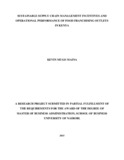Sustainable supply chain management incentives and operational performance of food franchising outlets in kenya
Abstract
Food franchising outlets are facing rapid growth in markets such as Kenya and a concurrent need
for sustainable supply chain management. The companies attempt to address supply risk and
threats to the triple bottom line (TBL) through managing suppliers and inputs and at the same time
need to overcome the uncertainty raised by the host environment. Government policy seems to
influence the directions and choice of sustainable supply chain management activities engaged in
by the firms. Food franchising outlets are aware that local stakeholder expectations may affect
operations significantly and as such, they are needed to carefully evaluate their operations in the
host market and seek balance between sustainable supply chain management practices and local
stakeholder expectations. The study therefore looks at the incentives adopted for sustainable supply
chain management and operational performance of food franchising outlets in Kenya. The research
design for the study was descriptive survey. The researcher proposed to do a census on all the listed
fifteen food franchise outlets. The researcher utilized the statistical package for Social sciences
(SPSS) software to analyze the efficiency and effectiveness of the data in details. The study finally
concludes that SSCM incentives are significant in enhancing the operational performance of the
food franchise outlets and from the findings it was concluded that the outlets should adopt SSCM
as part of their operational strategy in order to enhance operational performance and the study
recommended that awareness about SSCM should be raised in order for sustainability to be deeply
entrenched in the activities and philosophy of the firm.

